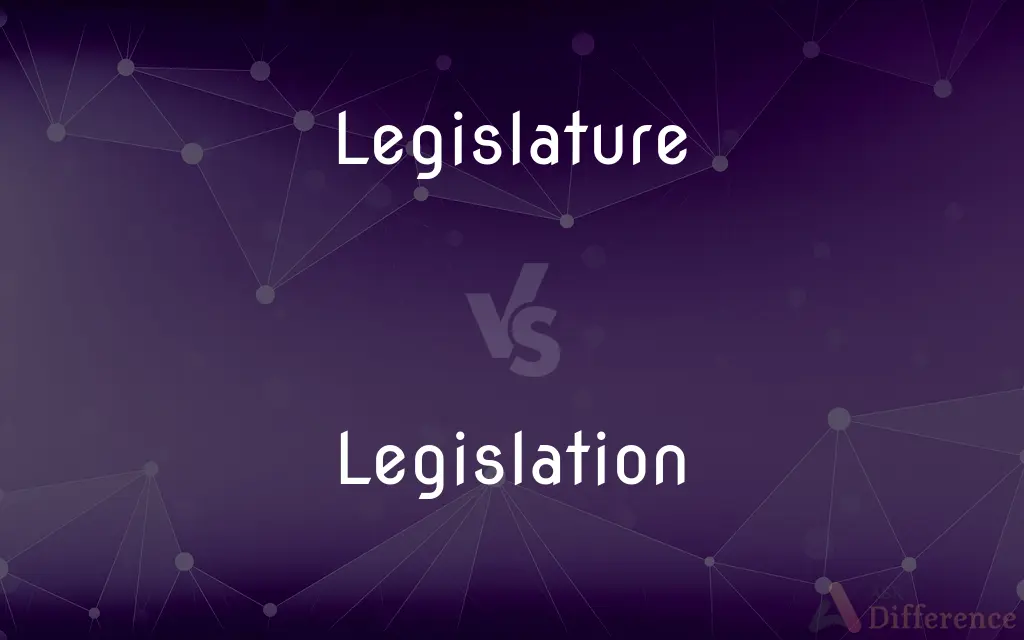Legislature vs. Legislation — What's the Difference?
By Tayyaba Rehman — Updated on November 7, 2023
Legislature refers to a governmental body that makes laws; legislation is the actual laws or the process of creating them.

Difference Between Legislature and Legislation
Table of Contents
ADVERTISEMENT
Key Differences
Legislature is the governmental body or assembly that has the authority to make or amend laws. It's a collective entity, typically consisting of elected officials who debate and vote on proposed laws. The term legislature encapsulates the people within the system as well as the system itself.
Legislation, on the other hand, refers to the laws themselves or the process of creating those laws. It's the product of the legislature's work. Legislation can encompass bills, acts, statutes, and other legal instruments once they are passed and enacted.
The legislature operates as the venue where representatives come together to discuss, propose, and deliberate on potential legislation. It's the institutional body that holds legislative power. The legislature's role is not only to pass legislation but also to scrutinize the government's work.
Whereas legislation is the output, it can be pointed to, read, analyzed, and applied. It stands as a documented set of rules that govern a society. Legislation is often subject to judicial interpretation, but it originates from the legislative body.
Comparison Chart
Definition
A body of lawmakers.
Laws or the process of creating laws.
ADVERTISEMENT
Function
Makes and amends laws.
The set of laws made.
Entity
A group or institution.
A product or process.
Example
Congress in the United States.
The Clean Air Act is an example.
Relation
Performs the action of legislating.
The result of the action of legislating.
Compare with Definitions
Legislature
A governmental body that creates laws.
The legislature convened to discuss the new bill.
Legislation
Documents that constitute written laws.
The attorney studied the recent legislation.
Legislature
The institution where laws are made.
The tax reform bill passed through the legislature.
Legislation
The process by which statutes are enacted.
Legislation can be a lengthy process.
Legislature
The system through which public policy is formed.
The legislature was in session for six months.
Legislation
The collective body of laws in a jurisdiction.
The legislation was updated last year.
Legislature
An assembly or group of legislators.
She was elected to serve in the state legislature.
Legislation
The act of making or enacting laws.
Legislation was introduced to address the issue.
Legislature
A formal organized body with legislative authority.
The legislature debated the proposal for hours.
Legislation
A law or set of laws passed by a legislature.
The new legislation affected tax rates.
Legislature
A legislature is an assembly with the authority to make laws for a political entity such as a country or city. They are often contrasted with the executive and judicial branches of parliamentary government in the separation of powers model.
Legislation
Legislation is law which has been promulgated (or "enacted") by a legislature or other governing body or the process of making it. Before an item of legislation becomes law it may be known as a bill, and may be broadly referred to as "legislation", while it remains under consideration to distinguish it from other business.
Legislature
The legislative body of a country or state
The Nevada state legislature passed a law to prohibit dumping of nuclear waste
Legislation
Laws, considered collectively
Housing legislation
Legislature
An officially elected or otherwise selected body of people vested with the responsibility and power to make laws for a political unit, such as a state or nation.
Legislation
The act or process of legislating; lawmaking.
Legislature
A governmental body with the power to make, amend and repeal laws.
Legislation
A proposed or enacted law or group of laws.
Legislature
(Canada) The legislative assembly of a province or territory, as opposed to the federal parliament.
Legislation
The act of legislating; preparation and enactment of laws.
Pass legislation
There is a lack of legislation about human cloning.
Legislature
(Canada) A legislative building.
Legislation
Law which has been enacted by legislature or other governing body
Legislature
The body of persons in a state or kingdom invested with power to make and repeal laws; a legislative body.
Without the concurrent consent of all three parts of the legislature, no law is, or can be, made.
Legislation
The act of legislating; preparation and enactment of laws; the laws enacted.
Pythagoras joined legislation to his philosophy.
Legislature
Persons who make or amend or repeal laws
Legislation
Law enacted by a legislative body
Legislation
The act of making or enacting laws
Common Curiosities
What does the legislature do?
The legislature makes and changes laws.
Can anyone be part of a legislature?
Members of a legislature are usually elected or appointed officials.
What is legislation?
Legislation is the collection of laws passed by the legislature or the process of lawmaking.
Can the executive branch make legislation?
The executive can propose legislation, but only the legislature can enact it.
Is legislation binding?
Once enacted, legislation is binding law that must be followed.
Can legislation exist without a legislature?
Typically no, because legislation is produced by a legislature.
Are regulations and legislation the same?
Regulations are rules made under the authority of legislation.
Is "congress" another word for legislature?
Congress is a specific type of legislature, particularly in the U.S.
Is legislation the same as law?
Yes, legislation refers to the body of laws or a single law enacted.
How is legislation created?
Through the legislative process, which involves debate, voting, and enactment.
Who writes legislation?
Legislation is written by legislators, sometimes with the help of legal experts.
What powers does the legislature have?
Beyond lawmaking, legislatures often have budgetary and oversight functions.
How does one become a member of the legislature?
Members are typically chosen through elections or appointments.
Can legislation be vetoed?
Yes, the executive branch may veto legislation, which the legislature can often override.
Does the legislature interpret laws?
No, that's the role of the judiciary.
Share Your Discovery

Previous Comparison
Allotter vs. Allottee
Next Comparison
Scattergun vs. ShotgunAuthor Spotlight
Written by
Tayyaba RehmanTayyaba Rehman is a distinguished writer, currently serving as a primary contributor to askdifference.com. As a researcher in semantics and etymology, Tayyaba's passion for the complexity of languages and their distinctions has found a perfect home on the platform. Tayyaba delves into the intricacies of language, distinguishing between commonly confused words and phrases, thereby providing clarity for readers worldwide.















































